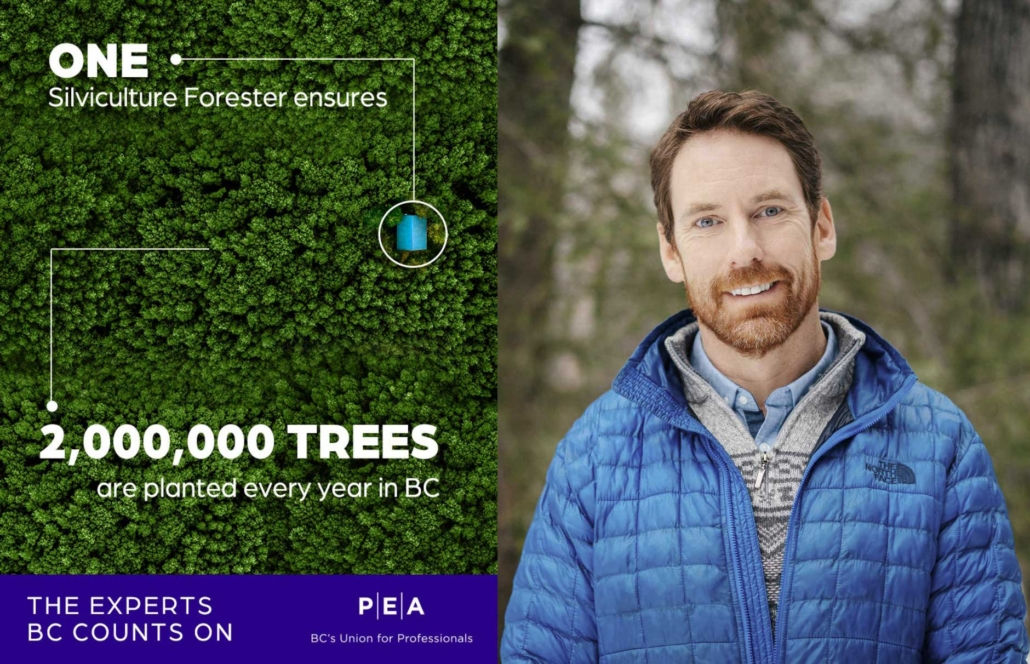Foresters: Growing BC’s future forests
BC’s professional foresters help grow resilient trees to withstand climate change
In the Bear Lake region north of Prince George, an expanse of pine, spruce, Douglas fir and alpine fir grows strong and resilient. The tree species were carefully selected by professional foresters in British Columbia to produce a site that could sustain variety, withstand climate change and support the ecology and wildlife of the region—mammals, fish, birds, insects and vegetation. Standing in that forest today, Larry Fielding, a woodlands supervisor with BC Timber Sales (BCTS), is awed at the last 15 years of bountiful growth. He helped reforest the site around 2010.
“It can be difficult for a reforested site to support that many different tree species,” Fielding explains. “But we chose trees that were ecologically suited for the site, and everything is growing really well. It gave me confidence in our work, seeing this healthy, resilient forest.”
The Bear Lake site is an example of successful reforestation that is taking place across the province. Fielding is one of 550 registered professional foresters working in 33 communities in the province for BCTS, part of the Ministry of Forests. Based in Prince George, Fielding became a registered professional forester in 2006, after graduating from the University of Northern British Columbia. He started with BCTS in 2007, helping to sustainably maintain forests on Crown land, which makes up 94% of the province’s total area of 944,735 square kilometers. A woodlands supervisor since 2009, his work focuses on silviculture as well as supervising a team of professional foresters.
“Right now is an exciting time in forestry because there’s a real focus on diversity, wildlife habitat and a lot of different values—and not just timber values,” he explains. “We’re trying to balance economic, cultural, social and biological values. We’re listening to the public, Indigenous people and stakeholders about what they value and what they want to see on the land base.”
Professional foresters in the public service in BC are members of the PEA in the Government Licensed Professionals chapter. Educated in the science of forestry, they play a crucial role in maintaining healthy forests, which is critical to the province’s environmental and economic wellbeing. They focus on reforesting sites that have been harvested for BCTS and helping those new forests thrive.
On average, each silviculture forester like Fielding oversees the planting of approximately two million trees every year. To choose which species to plant, they conduct research into seed varieties, examine climate modelling, explore tree breeding and study and manage for forest health, aiming to maintain as much natural vegetation as possible. Gone are the days of reforesting with monocultures; foresters have learned over the years that single-species forests are not as resilient as those with varied trees types and ages. The more the merrier—their goal is to plant as many species as a site is likely to support.
After planting, professional foresters carefully monitor reforested areas, surveying them regularly to track growth progress and resilience to threats. They gather data and information to continuously improve their work and make good choices for BC’s forests.
“We aim for forests that support wildlife, riparian function, Indigenous cultural values and forest structure. Any day I get out in the field, I learn something,” Fielding adds.
BC has more certified forest land to care for than any other jurisdiction in the world, with the exception of Canada as a whole. The work of our provincial foresters is vital to maintaining this natural resource, especially given recent wildfires, droughts and heatwaves.
“We need forests that, 80 years from now, are going to be as resilient as possible to weather events and climate change,” Fielding says. “It’s very rewarding for me to see a healthy, forested site with trees that I played a role in planting years ago. It gives me a lot of confidence that the forest is going to be healthy and mature and will be available to support BC in the future. It makes me proud.”

